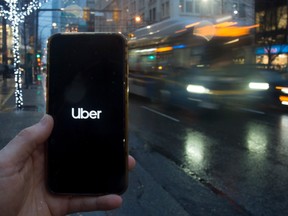It was the first time a ride-hailing app in Canada has been the subject of a human rights tribunal, the ruling said

Article content
Uber Canada has been ordered to pay $35,000 to a man who uses a wheelchair after the B.C. Human Rights Tribunal found he was discriminated against because of his disability. The ride-hailing app was also ordered to offer those with disabilities accessible rides according to the ruling this week .
Complainant Martin Bauer was granted the award “as compensation for injury to his dignity, feelings and self respect,” stated the ruling by tribunal member Amber Prince.
Advertisement 2
Article content
Article content
“Uber discriminated against Mr. Bauer in the area of services based on physical disability … (and) must provide a wheelchair accessible option in the Lower Mainland within one year of this decision,” she wrote.
It was the first time a ride-hailing app in Canada has been the subject of a human rights tribunal.
But Uber told the 2022 hearing into Bauer’s complaint that it didn’t violate the human rights code because it’s an app and doesn’t provide a service as defined under the code.
The company also said it was exempt from providing accessible rides in B.C. because of a law that allows Uber and other ride-hailing apps to pay a “per trip” fee instead of accommodating those with physical disabilities, according to the ruling.
The tribunal rejected both arguments and declared Uber contravened Section 8 of the B.C. Human Rights Code, which precludes discrimination on the basis of physical disability, and other factors.
Bauer was seeking $100,000 in compensation but Prince said she aligned the award with similar cases.
Bauer couldn’t be reached for comment, but told the hearing accessible transportation is of “enormous consequence” and it is “particularly important for myself since I am currently entirely reliant on wheelchair taxis.”
Article content
Advertisement 3
Article content
B.C.’s attorney general was named as a respondent in the complaint and in its submission said that in early 2020 it implemented a 30-cent per-trip fee under the passenger transportation act or regulation as an incentive for ride-hailing apps to provide a wheelchair accessible ride option, not to exempt them from offering one.
Uber argued that the act and regulation conflicted with the code because it was inconsistent for the province to approve the pre-trip fee for Uber and then face punishment for paying it.
It also said the per-trip fees were to be collected by the province and be redistributed to increase wheelchair accessible transportation, and that not all the money has been used for that purpose.
Uber’s Yanique Williams told the hearing the province announced in a news release on Feb. 1, 2023, the per-trip fees would be used to help offset extra costs that taxi owners face to provide wheelchair accessible vehicles so that the number of such vehicles would increase.
On Jan. 1, 2023, the per-trip fee was raised to 90 cents from 30 cents.
In a statement on Wednesday, Uber spokeswoman Keerthana Rang said in an email that Uber complies with laws on accessibility, paying fees and having wheelchair accessible vehicles available and is reviewing the decision and its appeal options.
Advertisement 4
Article content
She also said the province has collected “tens of millions of dollars” in fees from the ride-share industry and “only a small portion” has been given to taxi owner-operators. Ride-share drivers can’t access those funds to use it increase accessible rides, she said.
“We continue to urge the provincial government to allocate the accessibility fees collected from ride-share trips to achieve better accessibility solutions for riders in B.C.,” said Rang.
Communications director Catherine Pate said B.C.’s attorney general ministry is “reviewing the tribunal’s decision.” The ministry wasn’t able to comment further on Uber’s comments before deadline.
The B.C. Taxi Association said that, for the first time last year, a small number of cab companies received more than $2 million to purchase wheelchair-accessible vehicles, according to president Mohan Kang.
He said to buy and convert each van costs $85,000, compared to about $45,000 for a Prius car. He said they also cost more to operate in gas and insurance, and each trip takes longer to load and unload, so they’re not as profitable.
Advertisement 5
Article content
Taxi companies “100 per cent support that Uber should also provide (wheelchair accessible vans) because why not?”
Kang said people with disabilities “deserve to be served on a priority basis, the community owes it to them.”
Prince said in her decision that she’s not aware of any Canadian human rights cases that address Uber’s services, and “it’s surprising” there was only one in the U.S., in which Uber also argued it wasn’t providing the rides, just the app to connect the rides to the riders.
The U.S. district court decision, which was ruling on a claim by the Equality Rights Centre under American human rights legislation on behalf of wheelchair users, said that Uber “systematically discriminates” against the users because they pay more and wait longer for Uber’s services than other passengers, dismissed Uber’s argument that it wasn’t a service provider, Prince wrote.
Recommended from Editorial
Bookmark our website and support our journalism: Don’t miss the news you need to know — add VancouverSun.com and TheProvince.com to your bookmarks and sign up for our newsletters here.
You can also support our journalism by becoming a digital subscriber: For just $14 a month, you can get unlimited access to The Vancouver Sun, The Province, National Post and 13 other Canadian news sites. Support us by subscribing today: The Vancouver Sun | The Province.
Article content





